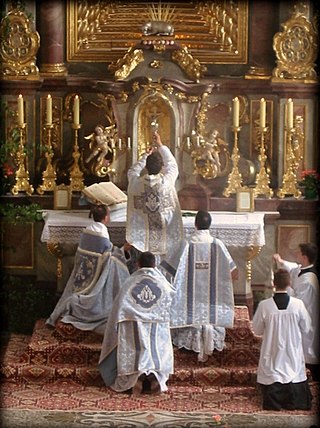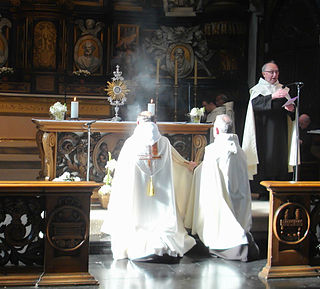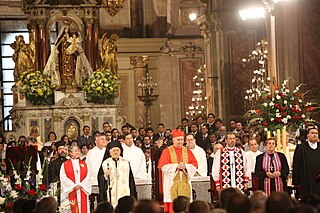Anglicanism is a Western Christian tradition that has developed from the practices, liturgy, and identity of the Church of England following the English Reformation, in the context of the Protestant Reformation in Europe. It is one of the largest branches of Christianity, with around 110 million adherents worldwide as of 2001.

A deacon is a member of the diaconate, an office in Christian churches that is generally associated with service of some kind, but which varies among theological and denominational traditions. Major Christian churches, such as the Catholic Church, the Oriental Orthodox Churches, the Eastern Orthodox Church, the Scandinavian Lutheran Churches, the Methodist Churches, the Anglican Communion, and the Free Church of England, view the diaconate as an order of ministry.

Traditionalist Catholicism is a movement in the Catholic Church that emphasises beliefs, practices, customs, traditions, liturgical forms, devotions and presentations of teaching associated with the Church before the Second Vatican Council (1962–1965), in particular the Tridentine Mass.

Closed communion is the practice of restricting the serving of the elements of Holy Communion to those who are members in good standing of a particular church, denomination, sect, or congregation. Though the meaning of the term varies slightly in different Christian theological traditions, it generally means that a church or denomination limits participation either to members of their own church, members of their own denomination, or members of some specific class. This restriction is based on various parameters, one of which is baptism. See also intercommunion.
The Pastoral Provision is a set of practices and norms in the Catholic Church in the United States, by which bishops are authorized to provide spiritual care for Catholics converting from the Anglican tradition, by establishing parishes for them and ordaining priests from among them. The provision provides a way for individuals to become priests in territorial dioceses, even after Pope Benedict XVI's Anglicanorum Coetibus proclamation established the Personal Ordinariates, a non-diocesan mechanism for former Anglicans to join the Church.

Peter Julian Eymard was a French Catholic priest and founder of two religious institutes: the Congregation of the Blessed Sacrament for men and the Servants of the Blessed Sacrament for women.
James Brady Callan is a former Roman Catholic priest and one of the founders of the Spiritus Christi Community in Rochester, New York.

Benediction of the Blessed Sacrament, also called Benediction with the Blessed Sacrament or the Rite of Eucharistic Exposition and Benediction, is a devotional ceremony, celebrated especially in the Roman Catholic Church, but also in some other Christian traditions such as Anglo-Catholicism, whereby a bishop, priest, or a deacon blesses the congregation with the Eucharist at the end of a period of adoration.
In keeping with its prevailing self-identity as a via media or "middle path" of Western Christianity, Anglican sacramental theology expresses elements in keeping with its status as a church in the catholic tradition and a church of the Reformation. With respect to sacramental theology the Catholic tradition is perhaps most strongly asserted in the importance Anglicanism places on the sacraments as a means of grace, sanctification and forgiveness as expressed in the church's liturgy.

The Catholic Church has engaged in the modern ecumenical movement especially since the Second Vatican Council (1962-1965) and the issuing of the decree Unitatis redintegratio and the declaration Dignitatis humanae. It was at the Council that the Pontifical Council for Promoting Christian Unity was created. Those outside of the Catholic Church were categorised as heretics or schismatics, but in many contexts today, to avoid offence, the euphemism "separated brethren" is used.

The priesthood is the office of the ministers of religion, who have been commissioned ("ordained") with the Holy orders of the Catholic Church. Technically, bishops are a priestly order as well; however, in layman's terms priest refers only to presbyters and pastors. The church's doctrine also sometimes refers to all baptised (lay) members as the "common priesthood", which can be confused with the ministerial priesthood of the consecrated clergy.

Anglican interest in ecumenical dialogue can be traced back to the time of the Reformation and dialogues with both Orthodox and Lutheran churches in the sixteenth century. In the nineteenth century, with the rise of the Oxford Movement, there arose greater concern for reunion of the churches of "Catholic confession". This desire to work towards full communion with other denominations led to the development of the Chicago-Lambeth Quadrilateral, approved by the Third Lambeth Conference of 1888. The four points were stipulated as the basis for church unity, "a basis on which approach may be by God's blessing made towards Home Reunion":
Canon 915, one of the canons in the 1983 Code of Canon Law of the Latin Church of the Catholic Church, forbids the administration of Holy Communion to those upon whom the penalty of excommunication or interdict has been imposed or declared, or who obstinately persist in manifest grave sin:
Those who have been excommunicated or interdicted after the imposition or declaration of the penalty and others obstinately persevering in manifest grave sin are not to be admitted to holy communion.
Anglican–Roman Catholic dialogue is the historical communication between the Anglican Communion and the Roman Catholic Church, through their ecumenical relations. These were notably shaped subsequent to the Second Vatican Council (1962–1965).
John Francis O'Hern was an American prelate of the Roman Catholic Church who served as bishop of the Diocese of Rochester from 1929 until his death in 1933.
Paul Joseph Nussbaum, C.P. was an American prelate of the Roman Catholic Church. He served as bishop of the Diocese of Corpus Christi in Texas (1913–1920) and as bishop of the Diocese of Sault Sainte Marie-Marquette in Michigan (1922–1935).

In the liturgical traditions of the Catholic Church, the term ordination refers to the means by which a person is included in one of the holy orders of bishops, priests or deacons. The teaching of the Catholic Church on ordination, as expressed in the 1983 Code of Canon Law, the Catechism of the Catholic Church, and the apostolic letter Ordinatio sacerdotalis, is that only a Catholic male validly receives ordination, and "that the Church has no authority whatsoever to confer priestly ordination on women and that this judgment is to be definitively held by all the Church's faithful." In other words, the male priesthood is not considered by the church a matter of policy but an unalterable requirement of God. As with priests and bishops, the church ordains only men as deacons.
A personal ordinariate for former Anglicans, shortened as personal ordinariate or Anglican ordinariate, is an ordinariate, a canonical structure within the Catholic Church established in order to enable "groups of Anglicans" and Methodists to join the Catholic Church while preserving elements of their liturgical and spiritual patrimony.
The Ecumenical Catholic Communion (ECC) is an independent Catholic church based within the United States. Its members understand themselves as following the Catholic tradition without being in communion with the Bishop of Rome. The ECC is a confederation of independent communities based in the United States and Europe. The membership of the ECC is about 10,000, including seven bishops, and more than 50 communities across 20 states. In 2009, the Ecumenical Anglican Church (EAC), an independent church, joined the ECC. The ECC is a member of the National Council of Churches (NCC).

This is a glossary of terms used within the Catholic Church. Some terms used in everyday English have a different meaning in the context of the Catholic faith, including brother, confession, confirmation, exemption, faithful, father, ordinary, religious, sister, venerable, and vow.









